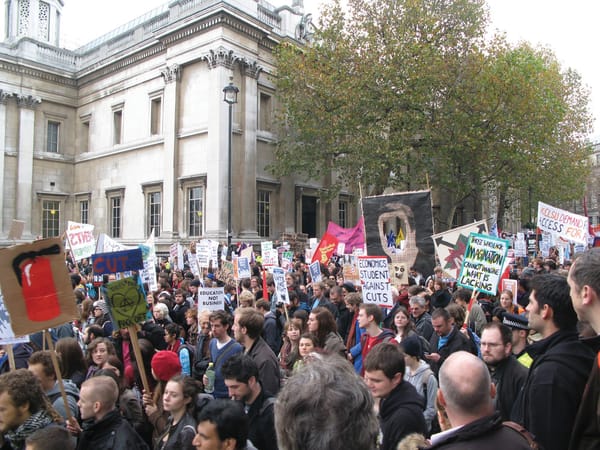November 30th: day of action
Izzy Koksal and Luke Sheldon on why students should care about Wednesday’s strikes
You may have heard news headlines describing the biggest strike in generations happening on 30th November, but perhaps thought little of it. What has striking got to do with students? Especially striking over pensions. Pensions seem ages away, we’re only just dealing with our students loans! The strike may seem like a distant and irrelevant event.
This is more than understandable. We, the authors, have been struggling to get to grips with the whole idea of the strike despite seeing ourselves as politically engaged and politically active – perhaps we’re just feeling weary after those ‘total policing’ tactics employed at the November 9th student demo.
But it is more than that; as students, striking – the mass refusal to work by employees demanding concessions from employers and/or the government – does not seem like something that we can take part in. The language, e.g. the use of the term ‘workers’, ostensibly excludes us, as well as other groups, including the unemployed.
However, there is in fact a long history of student strikes suggesting that the concept may not be so alien and irrelevant to us after all. Furthermore, perhaps the idea of striking seems antiquated – of a time when the majority of workers would put down their tools in the factory – not relevant in a service sector dominated economy, particularly when people’s jobs involve care work.
Back then, striking would cause significant financial losses for the employer; in public sector strikes this is not the case. Instead, public sector workers withdrawing their labour has immediate impacts on the people who they provide vital services for. This makes striking difficult for the strikers too, as they find themselves reluctant to see their library or school close. However, strikes are one of the only tools by which workers can try and negotiate the conditions in which they work every day. By withdrawing their labour, they remind us how important their services are. In this beginner’s guide to striking we shall explain what N30 is about and what is happening. We will also argue that students can and do play an important role in strikes, and that it is vital that we take part in N30.
Show our lecturers that we respect the work they do.
On Wednesday up to 3 million workers will be on strike (about 10% of the total workforce) in a long running dispute about the coalition government’s plans for ‘reforming’ the public sector pensions. A strike of this size has not been seen since the 1926 General strike with a total of 24 unions involved, including teachers and lecturers, probation officers, library staff, police civilians, refuse collectors, bus drivers, nurses, and museum staff.
Although the government likes to highlight how the Unison ballot for strike action only received a 29% turnout, on average the turnout has been 44%. This is the same as the turnout for the London mayoral elections, so the vote was as representative as our local democracy. The numbers are also expected to be bolstered by the thousands who join unions in the run-up so that they can strike as well.
The government claims to be worried about what they describe to be unsustainable pension plans with an aging population. Their proposals include moving the retirement age to 68, increasing pension contributions, judging the pension on your average salary instead of your final salary, and linking pensions to the lower CPI inflation instead of the current RPI inflation. This has lead unions to remark that the situation will be one where workers ‘pay more, work longer, get less’.
This involves us, as students, because our lecturers will be directly affected by these changes to pensions – both the University and College Union and the Association of Teachers and Lecturers are striking on Wednesday and we should show our support to our lecturers – speak to them about the issue or join them on the picket line. Or go further than this and arrange events on the picket line as students at the University of Birmingham have done.
The University of Birmingham Union have arranged for a teach-out on the picket with discussions including ‘Whatever happened to the right to protest?’, ‘Cuts are not the cure’, and ‘The Student Experience: An Utterly Shallow Concept’. Showing our lecturers that we respect the work they do and that we believe they should be fairly rewarded at the end of their job would mean a great deal to them.
Our collective demand for pensions justice is about fairness, however, there is also a pragmatic argument to it: simple sums show that in contrast to the government’s claims, pensions are in fact sustainable in their present state. The National Audit Office, the Office for Budget Responsibility, and the Institute for Fiscal studies all show how as a proportion of GDP the cost of public pensions will gradually decrease due to changes made by Labour and that they are currently at a peak. Thus, it is quite clear that our present pension system for the public sector is sustainable and fair as it is.
Yet, the government seems unwilling to accept this and back down. Whilst they have made two concessions regarding pensions, these do not go far enough to address unions’ and their members’ main concerns and therefore they have had to resort to strike action. Epitomising the ineptitude of the government’s bargaining in the talks with unions and just how little the government understand the grievances of ordinary workers, Cabinet Minister Francis Maude recently suggested that workers co-ordinate a 15 minute strike on N30 – also known as a tea break.
However, the strike action must not be seen in isolation, as a one-off event and solely about pensions. Therefore our role in the strike must go beyond students supporting their lecturers. The government’s attack on public sector pensions is simply yet another example of the government trying to shift responsibility for the deficit on those who cannot pay and who also bear no responsibility for the crisis itself. It is one attack amongst many which also include education, healthcare, and welfare – or everything that is good about our society.
We cannot know exactly how N30 will unfold – it certainly has the potential to have a tremendous impact with millions of people coming together to reject the austerity measures and create a humane society – but its significance will be that it is yet another form of action following on from and building on actions by UK Uncut, the Occupy movement, and the student protests that show that a great number of people are against the government’s austerity programme which is based on making the poor pay for an economic crisis that they did not cause.
The strike, therefore, is part of a wider movement against the government and its policies that is growing in momentum. Indeed, this can be seen by James Sevitt’s remarks from Occupy London which illustrates how many of these different movements are coming together:“As Occupy London is very much in support of those unions coming out on strike on Wednesday 30th November, we are busy getting prepared and its great to see unions lending their support to the Occupy movement. Expect to hear more from us about this soon!”
Furthermore, N30 itself has become more than about pensions – many other people who don’t work in the public sector will be looking to support the strike, as James describes above for Occupy London. As the Coalition of Resistance describe ‘it is clear that November 30th also represents a fundamental challenge to the cuts and privatisation programme of the ConDem Government.’ They have called for all those against the cuts to create a ‘Festival of Resistance, with pensioners, students and unemployed people joining together in a massive day of defence for jobs, the NHS, the Welfare State, and free education’.
Our role in this society is not just as a student, but as a member of our local community, and as a citizen of this country. It is therefore vital that we participate in this festival to protect what we value in our society, as all of these things are presently under threat.
Talk with one another, with your lecturers on the picket line, join the marches, occupy somewhere, arrange teach-outs or teach-ins on campus, do anything that you find meaningful, for it is a day of possibility.







